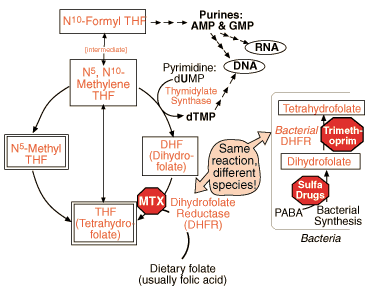
B12/Folate Problem set
Question 7: Folate reduction and recycling
Tutorial to help answer the questionAn antibacterial drug which acts by inhibiting dihydrofolate reductase is:
A. leuvocorin B. trimethoprim C. methotrexate D. a sulfa drug E. deoxycoformycin
Tutorial
Two inhibitors of the same enzyme?A short run-down of drugs related to folate metabolism:
| A. | leuvocorin actually restores folate, usually as a "rescue" after treatment of a patient with high doses of methotrexate or other dihydrofolate reductase (DHFR) inhibitor |
| B. | trimethoprim is the correct answer - it inhibits the bacterial form of DHFR with only minimal effect on the human enzyme. |  Fig. 7 - Drugs that inhibit THF formation in humans and bacteria |
| C. | methotrexate is also a DHFR inhibitor, but it is targeted to the human enzyme. Why? Its ability to inhibit DNA synthesis gives it anticancer properties (it is often followed by leuvocorin to minimize damage to normal tissues). |
| D. | sulfanilamide (a sulfa drug) works only in bacteria because it inhibits the biosynthesis of folate (something our bodies do not do anyway!). |
| E. | deoxycoformycin is not related to folate metabolism. It is an inhibitor of adenosine deaminase, another enzyme involved in purine metabolism. |
The University of Arizona
January 31, 2000
Contact the Development Team
http://www.biology.arizona.edu
All contents copyright © 2000. All rights reserved.